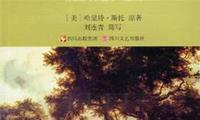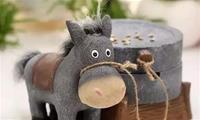野性的呼喚英語讀後感
My Call of the Wild ------ Enlightenment of The Call of the Wild " He sings a song of the younger world, which is the song of the pack." (Chapter VII The Sounding of the Wild) When the last sentence vanished from my eyes, I can still perceive an echo of a song - a wild song, which knocks up my dizzy mind that always cheerfully sink into the so-called civilized world without questioning. Wild, is no longer a symbol of the law of jungle but a headspring where streams out love, passion, bravery, loyalty, friendship, venture, competition and tolerance all these virtues can easily be found in the Call of the Wild. Jack London (1876-1916) is a worldwide renowned novelist. His stories successfully reflect the contradictory views of man’s nature and destiny in and against the wild, and his "fight to survive" notion has gained him and his works timeless popularity, particularly, the Call of the Wild It tells a story of a gigantic dog, named Buck, who is stolen from a rich and comfortable home and forced to learn to survive as an Alaskan sled dog. Buck, at first, is too savage for the company of man until he coincidently encounters his beloved master-kindhearted John Thornton. Finally, John’s incidental death breaks Buck’s last tie to the man and drives him into his long-desired wild with his pack. In the story, Buck and John simply adopt themselves to answer the call of the wild.
When it comes to Buck’s mind that one day he will eventually leave John- his master, all he wants to do is just to help him finish the gold-rush-trip. He " from then on, night and day, never put a halt, in desperation, he burst into long stretch of flight, did not to stay him (John)" (Chapter VII The Sounding of The Wild) Buck wished to remember John’s image forever, he "for two days and nights never left camp, never let Thornton out of his sight. He followed him about at his work, watched him while saw him into blankets at night and out of them in the morning…" (Chapter VII) When I read these words I just could not hold my tears bursting. Can a real man devote himself to loyalty and friendship in such a way? On the other hand, John Thornton is not only a dog-lover but also a brave and venturous man. He is so straightforward and simple that makes him an accommodating man. Once he firmly roots a goal into his heart, it seems that nothing could prevent him from accomplishing it except death.
I do not know whether the persistence is the most vital element to make a man successful, but what I know is that you are not far away from success once you occupy it. It is Jack London who plunges me into the animated wild from the hustle-and-bustle and from desperate city. There, I merely cannot deny the attraction of Buck’s bark, which enlightens me to pursue another lost half of the nature in mankind, and to dig out a true meaning of life. Dare we imagine that London intentionally employs Buck to set us a model with perfect characters (count barbarity out)? The answer is affirmed. We, as animals, are from the wild but shedding off more and more wild signs, which demonstrate us as the "uncivilized". However, who can fully guarantee that we have not overlooked some essential wild-endowed virtues?
Especially, nowadays, it seems more crucial for us to stop looking at the post-industrialized world and to ponder for a while. When cheats, betrayals, lies, lusts and crimes stuff a materialized society, whether London uses this novel to help himself escape the reality or warn the earthy people, to us, modern man, is all the same. It appears horrible that in modern society many people are enthusiastically talking about how to build up "special relations" to the authority, deceiving and lying to each other. To them life is a mask-wearing process rather than a hard work. Every time, you browse WebPages, scandals in politics, business, the entertainment circle and even on campus crowd into your eyes. Oh, what is the essence of human beings? What is the civilization to us? Do we need to look back at where we came from? Is it good or bad for us to speak out what we think and to do what the consciences demand us to? Are we wasting talents given by the mighty nature? Be an honest, straightforward, warmhearted, emotional and responsible man or be a shrewd, cold hearted and astute hypocrite?
While embracing the "civilized" rubbish, we are losing those good virtues, which are the calls of the wild. Once we lose them, we are to lose ourselves, and we will get nowhere. I wish this dreadful thought is totally a fallacy, but, now, it is chilling me hard. One day when I happen to stand on the top of a grand mountain to observe a boundless prairie enveloped by the sapphire firmament and combed by gusts of the rhythmical west wind, a morning sun sprinkles me her warmth and brilliance in a graceful way, however, at that moment, I am afraid that I cannot appreciate these beauties, I am a lost " civilized man" then. Please, please do not let come true while we are still able to answer the call of the wild.
野性的呼喚讀後感(一)
《野性的呼喚》是傑克·倫敦的代表作,它講了一隻叫巴克的狗被賣到阿拉斯加充當雪橇狗,在嚴酷的生存環境和主人的逼迫下從文明回到了原始的野蠻。這本書把環境的惡劣、人類的貪婪和殘忍以及生命和霸權的鬥爭描寫得淋漓盡致。
巴克在冒險剛開始時還太天真,經不起磨煉,但他以極強的適應性在嚴酷的環境中生存了下來,並一步步打敗了所有的對手,成為了雪橇狗中的王者,此時,他體內野性的力量越來越強大,回歸到大自然中的願望也越來越強烈。
巴克是一隻狗,但他也是有靈性的,當主人虐待他時他能明白,但當主人愛他時他也能明白,他能理解愛和忠誠,愛和忠誠的力量是無限的,當約翰·索恩頓與人打賭,讓巴克拉動一座半噸重的雪橇的是對主人的愛和忠誠,當約翰·索恩頓被印第安人所殺時,驅使巴克為主人報仇的也是愛和忠誠。
這本小說寫的是狗,也是反映人的世界。在冰天雪地的阿拉斯加,
總之,這本小說寫得很不錯,我推薦同學們都讀一下。
野性的呼喚讀後感(二)
看了傑克·倫敦的短篇小說《野性的呼喚》,薄薄的一本小書,帶來深深的思索。書中描寫了一隻名叫巴克的狗從一隻家養寵物,變成一隻適應蠻荒之地艱苦生活的工作犬,最終心中的野性被喚醒而成為一隻狼王的故事。使我思考。
人為什麼具有向上的精神,渴望挑戰,敢於鋌而走險,甘願忍受隨之而來的肉體和心靈的折磨?這可能源於原始的本能,即對食物和異性的欲望。
文明社會的人想要得到自己需要的事物,首先要具有能夠在蠻荒社會中,在棍子與牙齒的法則下能夠生存所必須具備的野蠻本能。這樣才能敢於拼搏、敢於爭取自己的需求;其次,要擁有智慧。文明社會比蠻荒社會在形式的層面上複雜,雖然兩個社會在本質上是一樣的,都信奉棍子與牙齒的法則,但如果在鬥爭中不講究方式、方法,不適應文明社會形式上的要求,就會失敗。
總之,個體想在群體中更好地生活,
野性的呼喚讀後感(三)
當我第一次翻開傑克倫敦的巨著當我第一次翻開傑克?倫敦的巨著——《野性的呼喚》時,那首淒涼而極富哲理的詩便深深地打動了我:“風俗的鏈條鎖不住遊牧部落跳躍的古老渴望;寒冬蕭條,沉沉睡去,野性將喚醒淒厲的詩行。”
整篇小說講述的是一隻叫巴克的狗的悲慘而令人激動的經歷以及它逐漸回歸到自己原始野性狀態的故事,而作者並沒有將它的遭遇講得如何驚險離奇,只將它擺在一個多樣的狗的群體中,
本性的復蘇,在作者筆下循序漸進自然的協調使得整個故事一氣呵成,讓人欲罷不能,也正是這緩慢而有序的過程,使得這種呼喚有力而影響深遠,使人不得不產生某種聯想,想探究自己的本性,並想面對它。
生命是矛盾的,世界是複雜的。()它有奸詐,也有忠誠;它有文明,也有野蠻。可是,這就是真實的人生,人生正因此而多彩,因此而燦爛,因此而生生不息……
時,那首淒涼而極富哲理的詩便深深地打動了我:“風俗的鏈條鎖不住遊牧部落跳躍的古老渴望;寒冬蕭條,沉沉睡去,野性將喚醒淒厲的詩行。”
整篇小說講述的是一隻叫巴克的狗的悲慘而令人激動的經歷以及它逐漸回歸到自己原始野性狀態的故事,而作者並沒有將它的遭遇講得如何驚險離奇,只將它擺在一個多樣的狗的群體中,在那個群體中它品嘗到了真正的狗的生活,而作者便適時地在其中插入了巴克內心的野性的呼喚及逐步復蘇,愈加清晰直到暴發。在它剛被拐賣時,它總是渴望回到原來的家,可每當它見到買下它的酒店老闆,“每一次發自喉頭的喊叫聲都變成野性的咆哮,”而這只是根植在它內心的野性的首次而微小的展露而已,它的第一個主義用棍子教會了它如何服從,巴克選擇了承認失敗但不垮下,這也只是本性告訴他的適者生存而已;跟隨第二個主人,它來到北方,它努力學會了許多生存的方式,開始退化,具備了最原始的狗的特徵,“長期潛伏在他身上的自然本性又復蘇了”祖先們把“古老的生活注在他體內”舊有的習性重又回到他身上,於是,“他仰起頭,沖著星光發出狼一般的長嗥……”在這時,它的本性,野性已基本回來了,這是生活使然,接著,巴克的統治欲上升,它的狡猾、奸詐,使它成為狗隊的首領,從而滿足了它原始的欲望,它的記憶中,“它更為清晰的是因遺傳而來的記憶”……已經退化的原始天性。
本性的復蘇,在作者筆下循序漸進自然的協調使得整個故事一氣呵成,讓人欲罷不能,也正是這緩慢而有序的過程,使得這種呼喚有力而影響深遠,使人不得不產生某種聯想,想探究自己的本性,並想面對它。
生命是矛盾的,世界是複雜的。它有奸詐,也有忠誠;它有文明,也有野蠻。可是,這就是真實的人生,人生正因此而多彩,因此而燦爛,因此而生生不息。
野性的呼喚英文讀後感
“When the long winter nights come on and the wolves follow their meat into the lower valleys, he may be seen running at the head of the back through the pale moonlight or glimmering borealis, leaping gigantic above his followers, his great throat a bellow as he sings a song of the younger world, which is the song of the pack.”
There was a script about the savage life in the frozen north of ice and snow. There were the unexplored north areas of America and the 19th-century Klondike Gold Rush which dragged men from the entire world into the hard wild to look for gold. There was a road where a gigantic dog like human fought his way to struggle in the wasteland. There was a civilized beast grew from mildness to wildness. And there came the call of the wild.
The background and plot
In the 19th century, it was said that gold had been found in the Klondike area in Northern California of vast wilderness, so thousands of people rushed into this uncultivated ground to seek for gold and fortune, which needed a large quantity of dogs to support for the transportation. There came up Buck story which we can’t define it as luckiness or unluckiness.
Buck, a dog weighed one hundred and forty pounds, tall, strong, and heavy muscled, lived a cozy and comfortable life in a rich family of a Judge named Miller, but was soled by evil gardener to two dog dealers and was took to Alaska as a sled dog.
Led by his second masters, two governmental couriers, he studied how to pull a sled and how to live in this cruel world where needed more cunning behavior and less fake moral and courtesy. For example, he learned to sleep in the snow hole to get warmness from the clod nights, and he learned to thief bacon and food from his masters and neighboring camps, as well as that, he learned how to fight effectively and efficiently with his antagonists and survive of the combat about the dominant leader with Spitz. In addition to those, he also went through the hardships in the toil on the ice layer, and he learned how to obtain the victory and stand on the wilderness which was beneficial to himself who can only fit the environment, but can’t defy the harness.
After the arduous trace and trail, they finally reached the destination, and then, after a short break, dogs including Buck led by a Scotch half-breed man stepped again on the ice land with the Salt Water Mail. It was a hard trip and a monotonous life operating like machine that dogs must undertake the heave pulling and poor condition where they were tired and short of weight. Buck’ partner, Dave who had something wrong inside suffered most of all, but pride as he was, pulling the sled was his holy missionary job which can fulfill his life and must be done until his death. However, the tough work was still continuous.
Thirty days passes, by which time Buck and his mates found how really tired and weak they are until they arrived at the last town. They were in a wretched state, worn out and worn out, which was not the tiredness that came from a brief and excessive effort and can be recovered from some hours’ rest, but was the dead tiredness that came through the slow and prolonged strength drainage of months of toil and had to need a long vocation to evacuate. Nevertheless, only three days after they were bought by a family including a foolish woman, a callow and ignorant youngster, and a middle aged man with weak and watery eyes. Never mind of dog’s frazzle, the third masters tried their best to lash out at them with whip, but Buck was not under very good command and not proud and interested of this career. Until they reached at the camp of Thornton, with the natural instinct and extreme weariness, Buck tolerated the whip from his so called masters and refused to go ahead which was his luckiness to meet his last master, Thornton.
Without doubt, Thornton was a good master, full of wisdom, intelligence and love who can manage Buck’s life comfortably and in order. By the careful attendance form his new master, Buck was on his feet quickly and solidly. Filled with the loying love toward his master, Buck companied him, saved his life for several times and helped him win the gambling party. Then, they faced into the East on an unknown trail to achieve where men and dogs as good as themselves has failed, as the call from the wild became stronger and stronger which attracted Buck to leave the civilization to look for. The knife that cut out the bound of Buck between his masters was the master’s deaths which left a void in the dog’s heart and a strengthened calling from the wild. Buck, a civilized dog, finally went back to wolves after thousands of generation by singing a song of the younger world, which is the song of the pack.
Survive of the fittest
The Call of the Wild abounded in Darwinism which advocated the evolutionism and natural selection theory.
In the process of having to leave the comfortable Miller’s house and adapt to the harsh primitive snowfield, Buck went through the changes from the mildness to wildness where he studied the law of club and fang and admitted the rule of failure without progress. “He had learned well the law of club and fang, and he never forewent an advantage or drew back from a foe he had started on the way to death.” “He must master or be mastered,” “Kill or be killed, eat or be eaten, was the law; and this mandate, down out of the depths of time, he obeyed.”
After analysis, we can find that related to the Darwinism, learning ability was an important factor of the victory of living of Buck. As a south dog living in the rich family and innocent environment, Buck was not wary of Manuel’s uncommon behavior, but situation has changed entirely after a period of barbaric life: he showed hostility to his all possible mates and took precaution of everything. As well as that, throwing away the moral standard and facing the death of starvation, Buck had an ability of thief. “This first theft marked Buck as fit to survive in the hostile Northland environment. It marked his adaptability, his capacity to adjust himself to changing conditions, the lack of which would have meat swift and terrible death.” In addition to those, his muscles became hard as iron, and he grew dumb to all ordinary pain, and he can successful take full use of all the elements no matter internal or external. That’s the progression of Buck which can equip him with thick helmets from being hurt deeply and made him be the fittest.
Not only did he learnt by experience, but instincts long dead became alive again. Maybe knowledge acquired by learning was Buck’s left hand, instincts his right. Good pedigree set up his first sense of a tall, strong and muscular potential king, while the instinct helped him to learn fast and save his life. “It was no task for him to learn to fight with cut and slash and the quick wolf snap.” “They came to him without effort or discovery, as though they had been his always.”
Buck changed as his living environment changed. With the change of environment, Buck, compared to the previous southern family dog that was mild and gentle, acquired many abilities and skills. He tried his best to live by becoming cunning, cold-blood, and cruel which make him step forward on the road of corpse and blood. Survive of the fittest which is demonstrated by adaptation to the environment and wielding the law to protect himself and attack on others made him roared on the top of the food chain and return to wolves.
All what Buck has done was not due to his reason and thought, but due to his fit. He was fit to everything surrounding him unconsciously and put him to the new way of living quickly.
“The theory, ‘Survival of the fittest’, is the law of biological evolution which implies that plants or animals adapt to the environment to survive or to die—it is the biological survival rule of brutal biosphere.” That is to say, the key of this law is that those who can fit the environment can survive, on the contrary, those failed to fit would be obsolete under the rule of elimination.
Peeping at Buck and his struggle, we can have a vision of us human that was also fighting in the battlefield with our mates and against our enemy. Filled with bustling stuff, we tried our best to stand on the top of right and authority only because that position would give us more materials and the sense of pride which we depended on to live. Flowers in the greenhouse didn’t know about the hardship of living, so they showed goodwill and send aroma to others; while life in the ice field where wind was blowing like knife and thick snow can bury people only showed a will of survive and cut up the useless goodness to wear on the coldness.
We must do it because we had to do it. The pack of animal was like a society of people. Death and genocide would happen on us if we were not willing to fit the environment thoroughly. To dance with the shackle of survive of the fittest was the policy we should carry out forever, the reason why our human stood on the top of biologic chain, and the rule of living of every individual.
My opinion on virtue and vice
Some people had said virtue was the biggest treasure that human should obey. There is no doubt that kindness, loyalty, honor, love, companionship, sympathy, mercy, and other virtue should be followed. However, I argue that there is transformation between different virtue and even the virtue and vice.
Showing the feature of three animals: dog, wolf and human, Buck was the bridge that connected the past and present. As the production of human civilization, dog was evolved from wolf and they would still howl on the wilderness if human didn’t raise and train them.
Buck was a mirror from which we can see ourselves. Through this dog, writer told us that only in a place where sun darted its forth beams and everything was in order human will wear the coat of basic goodness, otherwise, kindness would be eliminated if it met with the club and fang. In the cruel process of primitive accumulation of capitalism, mercy and sympathy was not needed for those quality can lead to death of innocent people. In the period of survive of the fittest, life was not concerned with civilization, while wilderness was the real marrow of life and echoing for the wilderness was the beginning of revival. Buck realized that “Mercy did not exist in the primordial life. It was misunderstood for fear, and such misunderstanding made for death.” This phenomenon can be seen in dogs as well as human. Wilderness were calling for human and eliminating the kindness in human’s heart stealthily.
In A Treatise of Human Nature, British philosopher David Hume has said moral came from human’s emotion and conscience but not rationality. The essence of moral existed in the perceptual knowledge, but not rational knowledge. Therefore, the reason why moral distinctions had the division of virtue and vice was that the judgment of moral came from human’s attitude toward their internal actions and external objects. The judgment of moral came from our interest appeal; that is to say, the judgment of moral came from what was good to us, but not what is good.
Let us think the question that which direction of Buck’s change to a beast was, progression or retrogression? The answer was that we can’t answer because he survived due to that he threw away those so called virtue and carry out those so called villainy. All what Buck did was under the pressure of living, and he responded to the call of the wild only because he wanted to live. Maybe in the comfortable and civilized Judge’s house, he would stick to the standard of moral and protect the respect of Judge’s riding whip by dying under his whip. But in this cold field, sticking to those so called moral was a fool. Possibly in this kind of world, brutality, cold-bloodedness, cunning and so on was the moral.
The division of virtue and vice was the refection of the division of civilization and wilderness to some degree. Maybe we can’t define what moral was and what vice was now in some scene, but we can try to last for enough time to seek for the answer.
Run after the free life
The call from the wild stood for human’s nature to run after a simple, independent and free life.
Buck was bored of the complex life where he must deal with such a big net of relationship. He just wanted to run and leap through the forest, howled under the grey moonlight, ate what he liked and killed what he liked without many rules to obey. No one desired to live a complicated life for it’s difficult and tiring to reckon other people, while life in the wilderness was just that eat or eaten, kill or killed and there was no middle ground. Easy and simple life was set up on the uncivilized world where creatures didn’t have so much relation and elements to consider. Only being independent from all that can we find what we wanted.
When unpracticed Charles and his relatives sunk in a ice hole, writer said that “A yawning hole was all that was to be seen.” That hole was a capitalistic vast mouth that can eat people, but which would be rotten if we escaped from it. “Here a yellow stream flows from rotted moose—hide sacks and sinks into the ground, with long grasses growing through it and vegetable mould overrunning it and hiding its yellow from the sun.” The gold that Thornton got has become a yellow stream because they were eroded by natural power and lost their value. Imagine in a world where was entirely natural and uncivilized, gold, a kind of iron and currency, was entirely futile, isn’t it?
Being free of human world and even free of materials, Buck got a totally new life where he can run at the head of the pack through the pale moonlight to release his vitality and got comfort from nature. We needed materials actually, but material was void actually. How can we get free? To get free of our hearts.
Conclusion
There are two sentences I’d like to mention. First, human beings, never degenerate into beasts. Second, beasts, never degenerate into human beings. Correctness of those two sentences should be discussed.
Human’s progression began in the point when human beings evolved from wilderness period to civilization, but the retrogression also began at the point when people shared the feast of civilization. For us who are far away from the wilderness and raised and trained by civilization, this book gives us a new vision.
Sometimes a picture floating in my mind: in the icy forest, a silhouette of Buck as a wolf caned his neck to howl toward the pale moonlight to echo the howling of pack. That’s the song of animal, and the chant of human, and the snarl of life.
時,那首淒涼而極富哲理的詩便深深地打動了我:“風俗的鏈條鎖不住遊牧部落跳躍的古老渴望;寒冬蕭條,沉沉睡去,野性將喚醒淒厲的詩行。”
整篇小說講述的是一隻叫巴克的狗的悲慘而令人激動的經歷以及它逐漸回歸到自己原始野性狀態的故事,而作者並沒有將它的遭遇講得如何驚險離奇,只將它擺在一個多樣的狗的群體中,在那個群體中它品嘗到了真正的狗的生活,而作者便適時地在其中插入了巴克內心的野性的呼喚及逐步復蘇,愈加清晰直到暴發。在它剛被拐賣時,它總是渴望回到原來的家,可每當它見到買下它的酒店老闆,“每一次發自喉頭的喊叫聲都變成野性的咆哮,”而這只是根植在它內心的野性的首次而微小的展露而已,它的第一個主義用棍子教會了它如何服從,巴克選擇了承認失敗但不垮下,這也只是本性告訴他的適者生存而已;跟隨第二個主人,它來到北方,它努力學會了許多生存的方式,開始退化,具備了最原始的狗的特徵,“長期潛伏在他身上的自然本性又復蘇了”祖先們把“古老的生活注在他體內”舊有的習性重又回到他身上,於是,“他仰起頭,沖著星光發出狼一般的長嗥……”在這時,它的本性,野性已基本回來了,這是生活使然,接著,巴克的統治欲上升,它的狡猾、奸詐,使它成為狗隊的首領,從而滿足了它原始的欲望,它的記憶中,“它更為清晰的是因遺傳而來的記憶”……已經退化的原始天性。
本性的復蘇,在作者筆下循序漸進自然的協調使得整個故事一氣呵成,讓人欲罷不能,也正是這緩慢而有序的過程,使得這種呼喚有力而影響深遠,使人不得不產生某種聯想,想探究自己的本性,並想面對它。
生命是矛盾的,世界是複雜的。它有奸詐,也有忠誠;它有文明,也有野蠻。可是,這就是真實的人生,人生正因此而多彩,因此而燦爛,因此而生生不息。
野性的呼喚英文讀後感
“When the long winter nights come on and the wolves follow their meat into the lower valleys, he may be seen running at the head of the back through the pale moonlight or glimmering borealis, leaping gigantic above his followers, his great throat a bellow as he sings a song of the younger world, which is the song of the pack.”
There was a script about the savage life in the frozen north of ice and snow. There were the unexplored north areas of America and the 19th-century Klondike Gold Rush which dragged men from the entire world into the hard wild to look for gold. There was a road where a gigantic dog like human fought his way to struggle in the wasteland. There was a civilized beast grew from mildness to wildness. And there came the call of the wild.
The background and plot
In the 19th century, it was said that gold had been found in the Klondike area in Northern California of vast wilderness, so thousands of people rushed into this uncultivated ground to seek for gold and fortune, which needed a large quantity of dogs to support for the transportation. There came up Buck story which we can’t define it as luckiness or unluckiness.
Buck, a dog weighed one hundred and forty pounds, tall, strong, and heavy muscled, lived a cozy and comfortable life in a rich family of a Judge named Miller, but was soled by evil gardener to two dog dealers and was took to Alaska as a sled dog.
Led by his second masters, two governmental couriers, he studied how to pull a sled and how to live in this cruel world where needed more cunning behavior and less fake moral and courtesy. For example, he learned to sleep in the snow hole to get warmness from the clod nights, and he learned to thief bacon and food from his masters and neighboring camps, as well as that, he learned how to fight effectively and efficiently with his antagonists and survive of the combat about the dominant leader with Spitz. In addition to those, he also went through the hardships in the toil on the ice layer, and he learned how to obtain the victory and stand on the wilderness which was beneficial to himself who can only fit the environment, but can’t defy the harness.
After the arduous trace and trail, they finally reached the destination, and then, after a short break, dogs including Buck led by a Scotch half-breed man stepped again on the ice land with the Salt Water Mail. It was a hard trip and a monotonous life operating like machine that dogs must undertake the heave pulling and poor condition where they were tired and short of weight. Buck’ partner, Dave who had something wrong inside suffered most of all, but pride as he was, pulling the sled was his holy missionary job which can fulfill his life and must be done until his death. However, the tough work was still continuous.
Thirty days passes, by which time Buck and his mates found how really tired and weak they are until they arrived at the last town. They were in a wretched state, worn out and worn out, which was not the tiredness that came from a brief and excessive effort and can be recovered from some hours’ rest, but was the dead tiredness that came through the slow and prolonged strength drainage of months of toil and had to need a long vocation to evacuate. Nevertheless, only three days after they were bought by a family including a foolish woman, a callow and ignorant youngster, and a middle aged man with weak and watery eyes. Never mind of dog’s frazzle, the third masters tried their best to lash out at them with whip, but Buck was not under very good command and not proud and interested of this career. Until they reached at the camp of Thornton, with the natural instinct and extreme weariness, Buck tolerated the whip from his so called masters and refused to go ahead which was his luckiness to meet his last master, Thornton.
Without doubt, Thornton was a good master, full of wisdom, intelligence and love who can manage Buck’s life comfortably and in order. By the careful attendance form his new master, Buck was on his feet quickly and solidly. Filled with the loying love toward his master, Buck companied him, saved his life for several times and helped him win the gambling party. Then, they faced into the East on an unknown trail to achieve where men and dogs as good as themselves has failed, as the call from the wild became stronger and stronger which attracted Buck to leave the civilization to look for. The knife that cut out the bound of Buck between his masters was the master’s deaths which left a void in the dog’s heart and a strengthened calling from the wild. Buck, a civilized dog, finally went back to wolves after thousands of generation by singing a song of the younger world, which is the song of the pack.
Survive of the fittest
The Call of the Wild abounded in Darwinism which advocated the evolutionism and natural selection theory.
In the process of having to leave the comfortable Miller’s house and adapt to the harsh primitive snowfield, Buck went through the changes from the mildness to wildness where he studied the law of club and fang and admitted the rule of failure without progress. “He had learned well the law of club and fang, and he never forewent an advantage or drew back from a foe he had started on the way to death.” “He must master or be mastered,” “Kill or be killed, eat or be eaten, was the law; and this mandate, down out of the depths of time, he obeyed.”
After analysis, we can find that related to the Darwinism, learning ability was an important factor of the victory of living of Buck. As a south dog living in the rich family and innocent environment, Buck was not wary of Manuel’s uncommon behavior, but situation has changed entirely after a period of barbaric life: he showed hostility to his all possible mates and took precaution of everything. As well as that, throwing away the moral standard and facing the death of starvation, Buck had an ability of thief. “This first theft marked Buck as fit to survive in the hostile Northland environment. It marked his adaptability, his capacity to adjust himself to changing conditions, the lack of which would have meat swift and terrible death.” In addition to those, his muscles became hard as iron, and he grew dumb to all ordinary pain, and he can successful take full use of all the elements no matter internal or external. That’s the progression of Buck which can equip him with thick helmets from being hurt deeply and made him be the fittest.
Not only did he learnt by experience, but instincts long dead became alive again. Maybe knowledge acquired by learning was Buck’s left hand, instincts his right. Good pedigree set up his first sense of a tall, strong and muscular potential king, while the instinct helped him to learn fast and save his life. “It was no task for him to learn to fight with cut and slash and the quick wolf snap.” “They came to him without effort or discovery, as though they had been his always.”
Buck changed as his living environment changed. With the change of environment, Buck, compared to the previous southern family dog that was mild and gentle, acquired many abilities and skills. He tried his best to live by becoming cunning, cold-blood, and cruel which make him step forward on the road of corpse and blood. Survive of the fittest which is demonstrated by adaptation to the environment and wielding the law to protect himself and attack on others made him roared on the top of the food chain and return to wolves.
All what Buck has done was not due to his reason and thought, but due to his fit. He was fit to everything surrounding him unconsciously and put him to the new way of living quickly.
“The theory, ‘Survival of the fittest’, is the law of biological evolution which implies that plants or animals adapt to the environment to survive or to die—it is the biological survival rule of brutal biosphere.” That is to say, the key of this law is that those who can fit the environment can survive, on the contrary, those failed to fit would be obsolete under the rule of elimination.
Peeping at Buck and his struggle, we can have a vision of us human that was also fighting in the battlefield with our mates and against our enemy. Filled with bustling stuff, we tried our best to stand on the top of right and authority only because that position would give us more materials and the sense of pride which we depended on to live. Flowers in the greenhouse didn’t know about the hardship of living, so they showed goodwill and send aroma to others; while life in the ice field where wind was blowing like knife and thick snow can bury people only showed a will of survive and cut up the useless goodness to wear on the coldness.
We must do it because we had to do it. The pack of animal was like a society of people. Death and genocide would happen on us if we were not willing to fit the environment thoroughly. To dance with the shackle of survive of the fittest was the policy we should carry out forever, the reason why our human stood on the top of biologic chain, and the rule of living of every individual.
My opinion on virtue and vice
Some people had said virtue was the biggest treasure that human should obey. There is no doubt that kindness, loyalty, honor, love, companionship, sympathy, mercy, and other virtue should be followed. However, I argue that there is transformation between different virtue and even the virtue and vice.
Showing the feature of three animals: dog, wolf and human, Buck was the bridge that connected the past and present. As the production of human civilization, dog was evolved from wolf and they would still howl on the wilderness if human didn’t raise and train them.
Buck was a mirror from which we can see ourselves. Through this dog, writer told us that only in a place where sun darted its forth beams and everything was in order human will wear the coat of basic goodness, otherwise, kindness would be eliminated if it met with the club and fang. In the cruel process of primitive accumulation of capitalism, mercy and sympathy was not needed for those quality can lead to death of innocent people. In the period of survive of the fittest, life was not concerned with civilization, while wilderness was the real marrow of life and echoing for the wilderness was the beginning of revival. Buck realized that “Mercy did not exist in the primordial life. It was misunderstood for fear, and such misunderstanding made for death.” This phenomenon can be seen in dogs as well as human. Wilderness were calling for human and eliminating the kindness in human’s heart stealthily.
In A Treatise of Human Nature, British philosopher David Hume has said moral came from human’s emotion and conscience but not rationality. The essence of moral existed in the perceptual knowledge, but not rational knowledge. Therefore, the reason why moral distinctions had the division of virtue and vice was that the judgment of moral came from human’s attitude toward their internal actions and external objects. The judgment of moral came from our interest appeal; that is to say, the judgment of moral came from what was good to us, but not what is good.
Let us think the question that which direction of Buck’s change to a beast was, progression or retrogression? The answer was that we can’t answer because he survived due to that he threw away those so called virtue and carry out those so called villainy. All what Buck did was under the pressure of living, and he responded to the call of the wild only because he wanted to live. Maybe in the comfortable and civilized Judge’s house, he would stick to the standard of moral and protect the respect of Judge’s riding whip by dying under his whip. But in this cold field, sticking to those so called moral was a fool. Possibly in this kind of world, brutality, cold-bloodedness, cunning and so on was the moral.
The division of virtue and vice was the refection of the division of civilization and wilderness to some degree. Maybe we can’t define what moral was and what vice was now in some scene, but we can try to last for enough time to seek for the answer.
Run after the free life
The call from the wild stood for human’s nature to run after a simple, independent and free life.
Buck was bored of the complex life where he must deal with such a big net of relationship. He just wanted to run and leap through the forest, howled under the grey moonlight, ate what he liked and killed what he liked without many rules to obey. No one desired to live a complicated life for it’s difficult and tiring to reckon other people, while life in the wilderness was just that eat or eaten, kill or killed and there was no middle ground. Easy and simple life was set up on the uncivilized world where creatures didn’t have so much relation and elements to consider. Only being independent from all that can we find what we wanted.
When unpracticed Charles and his relatives sunk in a ice hole, writer said that “A yawning hole was all that was to be seen.” That hole was a capitalistic vast mouth that can eat people, but which would be rotten if we escaped from it. “Here a yellow stream flows from rotted moose—hide sacks and sinks into the ground, with long grasses growing through it and vegetable mould overrunning it and hiding its yellow from the sun.” The gold that Thornton got has become a yellow stream because they were eroded by natural power and lost their value. Imagine in a world where was entirely natural and uncivilized, gold, a kind of iron and currency, was entirely futile, isn’t it?
Being free of human world and even free of materials, Buck got a totally new life where he can run at the head of the pack through the pale moonlight to release his vitality and got comfort from nature. We needed materials actually, but material was void actually. How can we get free? To get free of our hearts.
Conclusion
There are two sentences I’d like to mention. First, human beings, never degenerate into beasts. Second, beasts, never degenerate into human beings. Correctness of those two sentences should be discussed.
Human’s progression began in the point when human beings evolved from wilderness period to civilization, but the retrogression also began at the point when people shared the feast of civilization. For us who are far away from the wilderness and raised and trained by civilization, this book gives us a new vision.
Sometimes a picture floating in my mind: in the icy forest, a silhouette of Buck as a wolf caned his neck to howl toward the pale moonlight to echo the howling of pack. That’s the song of animal, and the chant of human, and the snarl of life.







